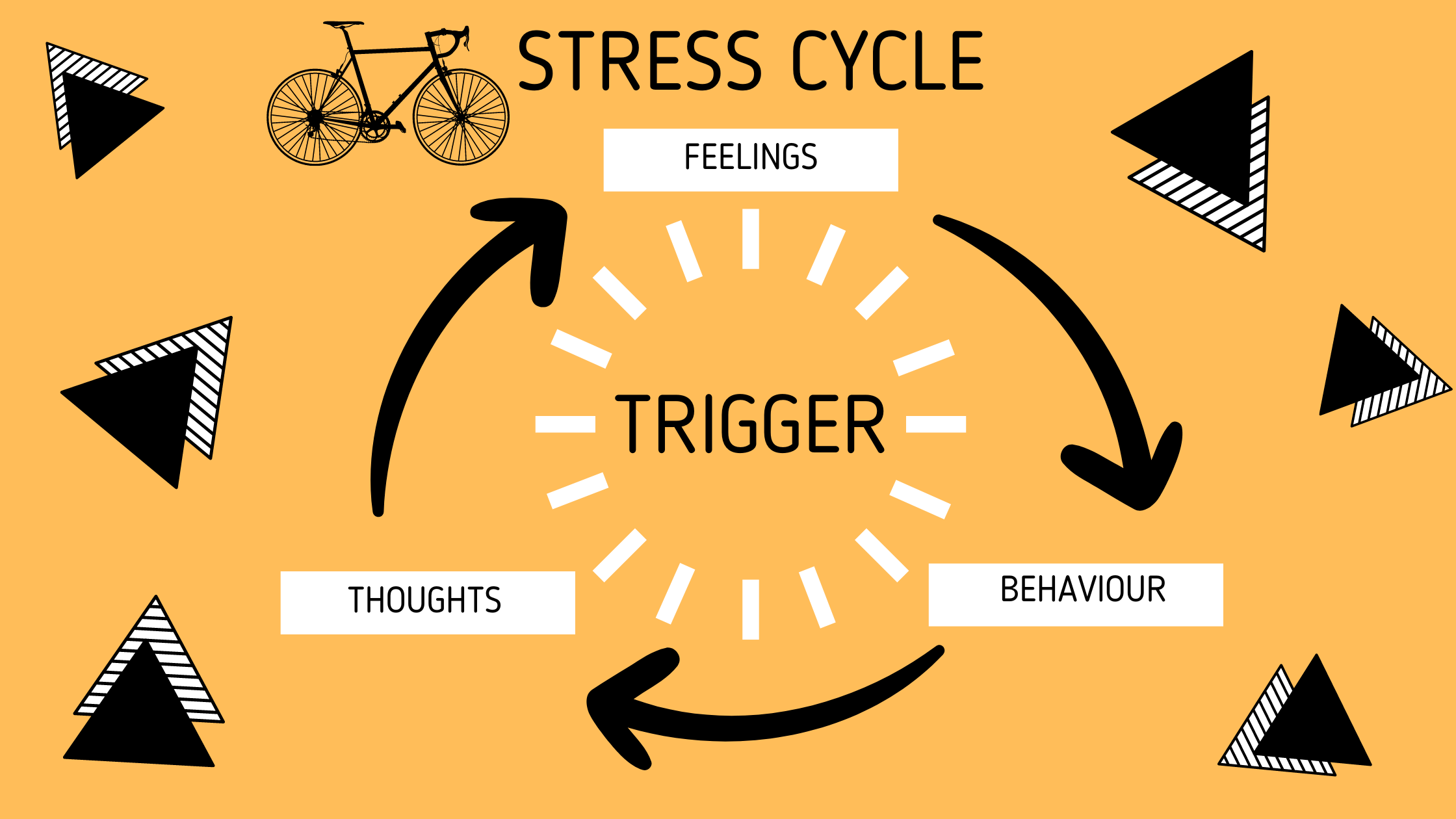
Your Mind Matters
A Space for Storytelling workshop exploring stress, anxiety & coping strategies for storytellers
Participant Notes
I hope you enjoyed our workshop. These notes summarise some of the key points we discussed and maybe a little bit more.

Stress & anxiety
We all have mental health. Mental health describes our emotional state, which tends to fluctuate throughout a single day, or even a single hour. Therefore ‘mental health’ is not the same as ‘mental health problems’ or ‘mental illness’, though the terms are often, unhelpfully, used interchangeably.
Mental Health definition example
“Mental health is about how we think, feel and act. Just like physical health: everybody has it and we need to take care of it. Our mental health is on a spectrum, and can range from good to poor.” (www.mind.org.uk)
Stress definition examples
“Stress can be described as anything which disturbs the normal balance of mental and physical health...” (aromatherapy author Davis P, 1988)
“Stress can affect our emotions, our body and how we behave, in lots of different ways. Sometimes when we are stressed, we might be able to tell right away. But at other times, we might keep going without recognising the signs.” (www.mind.org.uk)
Anxiety definition example
“Anxiety is a normal feeling of fear or panic. When we face stressful situations our brain tells us something is not right and that we need to deal with it…When we are not in stressful situations and still feel worried or panicky then anxiety can become a problem.” (www.youngminds.org.uk, edited)
Stress or anxiety - same or different?
Stress and anxiety both affect how we feel, think and behave. They can feel very similar when experienced and share many common symptoms (they involve the same nervous system responses) and confusingly the terms are often used interchangeably. Precisely how stress and anxiety are experienced can vary from person to person, as can the triggers. However there are some commonly identified differences between these two states.
Stress
Almost everyone experiences stress from time to time - its a natural response to difficult situations. Although often unpleasant, stress can be positive! A little stress when facing challenging situations, e.g. a storytelling performance or a difficult conversation, may help you perform to the best of your ability.
Stress tends to have recognisable triggers (eg that pending performance) and often eases once the difficult situation is over, allowing emotions to return to a calmer, more positive state. Stress is sometimes described as being a response to identifiable events / real situations which are in the present, or near future.
Stress is not a diagnosable medical condition in the UK, however if stress is experienced for much of the time it may develop into the more challenging state of anxiety.
Anxiety
Most people also experience anxiety from time to time - it is also a ‘normal’ reaction to difficult situations. However anxiety can feel more severe and more difficult to manage than stress. Feelings of anxiety do not always dissipate once the nerve-triggering events have passed, such as that storytelling performance.
Anxiety may manifest as severe worry about future events which might not happen, as opposed to stress triggers, which are generally identifiable. For instance, signs that anxiety has become problematic include when everyday situations (with no obvious challenging events) tigger anxiety, or if we find ourselves feeling anxious for much of the time or about ‘minor’ events, eg answering regular emails or food shopping. These are just some examples of problematic anxiety - there are others, of course.
Anxiety is a diagnosable medical condition in the UK. There are several anxiety-based mental health conditions, but the most frequently diagnosed is Generalised Anxiety Disorder, often referred to simply as GAD.
Summary
“Both stress and anxiety are a natural part of the fight or flight response* and the body’s reaction to danger.” (Medical News Today, 2020). *’Fight or flight’ refers to our nervous system responses to threat / danger, which may be real or perceived.
Although there are some key differences between stress and anxiety, there are also many shared characteristics. How we respond to stressful events is dependent on various factors, including our previous experience of coping with stress, how many stressful events we are facing at once and - crucially - what support we are able to access.
If you are worried about your stress / anxiety levels then a good place to start can be to ask yourself, ‘Is my anxiety stoping me doing everyday things, or things that used to bring me pleasure? Is it making these things harder to do and/or less enjoyable?’. If any answers is yes, then it is a good idea to seek support.

Change is Possible!
We often cannot choose which situations or events trigger our stress and anxiety, but we can choose to take steps to respond to them more positively. Read on…
Stress / Anxiety Cycle
A psychotherapy model of the relationship between thoughts, feelings and behaviours. Other models are available!
In this model a stressful event, eg a storytelling performance, may automactially trigger unhelpful thoughts, such as,
“I haven’t practised enough”, or “I’m not good enough”. These thoughts automatically trigger feelings such as worry and fear, which may be accompanied by physical symptoms such as headaches. This can lead us to behave in unhelpful ways, such as cancelling a booked performance or acting irritably with others. These behaviours can negatively influence our thoughts even more, and so the cycle continues.
Changing thought patterns, though possible, can be hard, and feelings are a direct response to thoughts. However, making small, positive behaviour changes is often much more realistic and can be really helpful in coping with stress.

Your Stress Management Tool Box
Managing stress requires a multi-faceted approach. One person’s stress management tools will not be the same as the next person’s (or at least, not exactly the same). Try to ignore the many ‘Do this to reduce stress!’ instructions which abound in cyberspace and find a selection of tools which work well for you. Be realistic when choosing your stress management tools. Can you afford to do this regularly? Can you fit this easily into your daily / weekly life? Effective stress coping strategies broadly fall into two camps…
Things you do on a regular basis which trigger positive nervous system responses, ie they help you to generally feel calmer (and are not disruptive to your health in the longer term). For instance, physical activity (proven to be very positive for mental health), reading, having a regular hobby, seeing friends or volunteering. Mindfullness falls into this category (note that mindfullness is not the same as meditation). Many people find following the research-based 5 Ways to Wellbeing helpful.
Strategies which you can call on to help manage acute stress, when it occurs. For instance there are various breathing techniques which many people find helpful (I personally use Square Breathing ). I also find the 3-3-3 technique really helpful in acute situations.
Talk it Through
Sometimes, no matter how many strategies we have in place, we need help from others. There are many talking therapy approaches on offer. Sometimes the range of options can be a little confusing, but persevere - the right approach for you is out there! See below for tips on finding a talking therapist.

Helpful resources
Information
There are lots of excellent sources of information about stress, anxiety and other mental health issues on-line. My go-to information sources are the charities MIND, Rethink Mental Illness and the Mental Health Foundation. If you are interested in the brain’s response to stress then click here.
Mental health support
There are lots of excellent sources of mental health information and support on-line (examples above). There are also many wellbeing apps of varying types, prices and quality - click here for NHS recommended apps (all free or low cost). I also recommend checking out the free OK Positive app. Full disclosure: at the time of writing I am doing some work with OK Positive, but I am not paid by them and I do not get commission for recommending them. I just think its a good app!
GPs are an essential gateway to mental health support for many people. Every local authority has a centrally funded IAPT service (Improving Access to Psychological Therapies) which provide talking therapy (usually CBT) and other support around stress, anxiety and mild depression. Your local council’s website should list the details, or ask your GP. You should be able to self refer (borough-dependant). Every borough also has a 24/7 mental health crisis service, for when urgent help is needed (in an emergency phone 999).
To find a private therapist try BCAP (British Association for Counselling and Psychotherapy).
Additional support:-
For men - CALM
For young people - Kooth and Young Minds (also check out what’s available locally, particularly your local CAMHS - Child and Adolescent Mental Health Service). Childline has excellent mental health and support resources for both younger children and young people.
Suicidal thoughts and feelings: The Samaritans and Maytree

Finally, Choosing your Story Words
These are my personal thoughts and will not resonate with everyone. For me, when telling stories which feature characters or situations where mental ill-health is involved (either clearly depicted or implied), it is important to put some thought into describing these characters and scenarios, considering the potential impact of the story’s words on the listeners. We will all have different approaches to this - the important thing is that we think about how we tell these stories. This is particularly important if telling stories which feature suicide.
These guides were not written for storytellers, but you may find them helpful:-
Mental Health Language - MIND (a leading UK mental health charity)
Top Tips for Reporting Suicide - The Samaritans (a leading UK suicide support and awareness charity)

Wellbeing Promise
Remember that doing small things can make a BIG difference to our wellbeing. So what wellbeing promise have you made to yourself?
“I promise that today I will look after my wellbeing by…”
(insert your personal wellbeing promise!)

Thank you for coming to ‘Your Mind Matters’ workshop.
I hope you enjoyed it and found it useful. I welcome your feedback (message Vanessa @ London Dreamtime or contact me direct).
If you spot any mistakes in these notes please do let me know and I will correct them.
Be safe, well, calm & content,
Emma
June 2024




